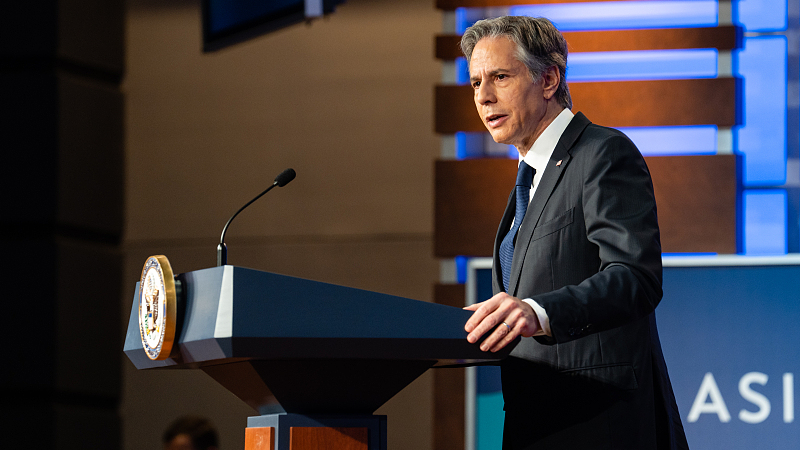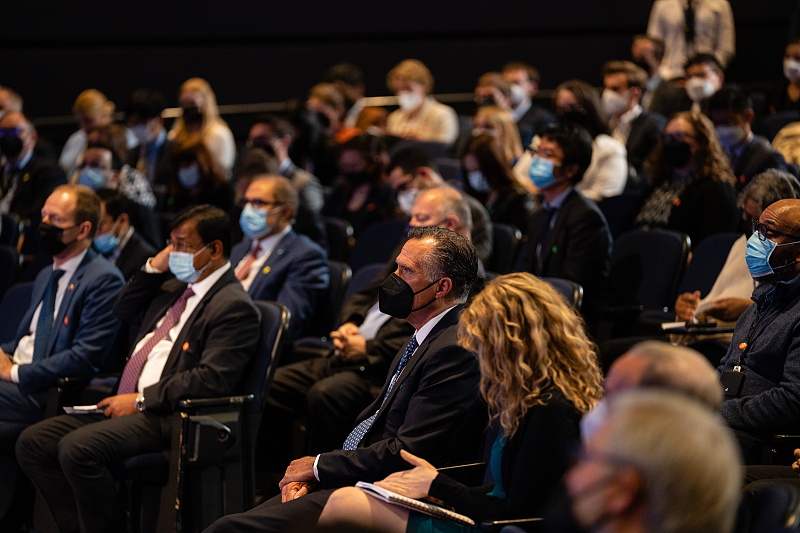
Antony Blinken, U.S. Secretary of State, speaks while outlining U.S. strategy toward China at George Washington University in Washington, D.C., U.S., May 26, 2022. /CFP
Antony Blinken, U.S. Secretary of State, speaks while outlining U.S. strategy toward China at George Washington University in Washington, D.C., U.S., May 26, 2022. /CFP
Editor's note: Stephen Ndegwa is a Nairobi-based communication expert, a lecturer-scholar at the United States International University-Africa, and an author and international affairs columnist. The article reflects the author's opinions and not necessarily the views of CGTN.
The new United States strategy to counter China's growing and unstoppable global influence, in its opinion "the most serious long-term challenge" to the international order, bordered on a declaration of war by U.S. Secretary of State Antony Blinken. Not that it is a totally new thing.
The new mantra, "invest, align, compete," aims at upping the ante and mobilizing the psyche of the U.S. population to face the so-called "China threat." In a long speech at George Washington University on May 26, Blinken blew hot and cold about the U.S. areas of engagement with its global rival, outlining the ammunition in its war chest to ensure that it does not lose its increasingly slippery hegemonic grip.
In outlining the renewed approach, Blinken inadvertently admitted failure of Joe Biden's administration to right the wrongs of his predecessors that have made the U.S. vulnerable to its adversaries. It shows how far the superpower has deviated from the path of growth, preferring to spend inordinate time and resources to secure its hegemony.
The new strategy also seeks to mobilize U.S. allies in a possible standoff with China on the Taiwan question. It is not understandable how the U.S. has unilaterally drawn other countries' boundaries while it fought a civil war to ensure a unified United States that includes the North and the South.
It is preposterous to assume that China has no friends, even among those the U.S. considers its close allies. If push came to shove, it would come as a shock that some would call for rationality rather than emotionally laden politics.
However, what was way off the mark was the assertion, rather insinuation that China has a hegemonic, diabolical, or even hidden agenda in pursuing a "a community of shared future for all humankind." Deep inside, Blinken knows that the second largest economy in the world seeks no such outcomes in trying to secure humanity and save it from the mounting global challenges.
The U.S. paranoia is understandable though. Its deterioration is becoming more apparent everyday not from external threats, but from its own internal weaknesses, idiosyncrasies, and contradictions. Right now, the U.S. is grappling with runaway gun crime which has actually become an epidemic. In just two weeks, at least 29 people have been killed in mass shootings in Buffalo, New York and Uvalde, Texas.
Preferring to bury their heads in the sand, the political class has refused to close ranks and come up with at least some commonsense gun ownership reforms that would require some basic due diligence on citizens seeking to buy firearms.
This is the kind of inertia that has given the U.S. the dubious distinction of recording the highest number of deaths from the COVID-19 pandemic, notwithstanding the fact that it has all the resources in its possession to fight the pandemic.
The foregoing are two things that have made the U.S. an object of sympathy and even derision in the global community. After the recent massacres, world leaders and global citizens alike are questioning the stability of the superpower as they know it. The escalating breakdown of law and order in the country is rather shocking.

People listen to Antony Blinken, U.S. Secretary of State, speak while outlining U.S. strategy toward China at George Washington University in Washington, D.C., U.S., May 26, 2022. /CFP
People listen to Antony Blinken, U.S. Secretary of State, speak while outlining U.S. strategy toward China at George Washington University in Washington, D.C., U.S., May 26, 2022. /CFP
It is getting worse in the U.S. The fact that right now it is easier to get a gun than baby formula speaks volumes about the state of the nation. These contradictions are the real enemies that are weakening the U.S. and not some far off phantom that wishes to take the superpower's place in the global scheme of things.
Not all is lost yet. There is a growing constituency in the U.S. that is ready to face the truth about the ramifications of its "war" with China. One instance is the realization that the trade war has costed the superpower's economy dearly, with a Moody's Analytics study in September 2019 showing that it had cost the U.S. economy almost 300,000 jobs and about 0.3 percent of real Gross Domestic Product.
The Federal Reserve Bank of New York and Columbia University also revealed that U.S. companies lost at least $1.7 trillion in the price of their stocks as a result of U.S. imposed tariffs on Chinese imports.
There is also a feeling that Blinken's anti-China tirade is escapist, and a convenient, if not timely action to divert U.S. growing helplessness against Russia - another of its "nemesis" - in the latter's ongoing war with Ukraine. But this will definitely be counterproductive, as the superpower continues to spread itself too thin geopolitically.
With all the chips in the air right now as it meddles in the internal affairs of other countries, the U.S. has no option but to eventually let the chips fall where they may.
(If you want to contribute and have specific expertise, please contact us at opinions@cgtn.com. Follow @thouse_opinions on Twitter to discover the latest commentaries in the CGTN Opinion Section.)

